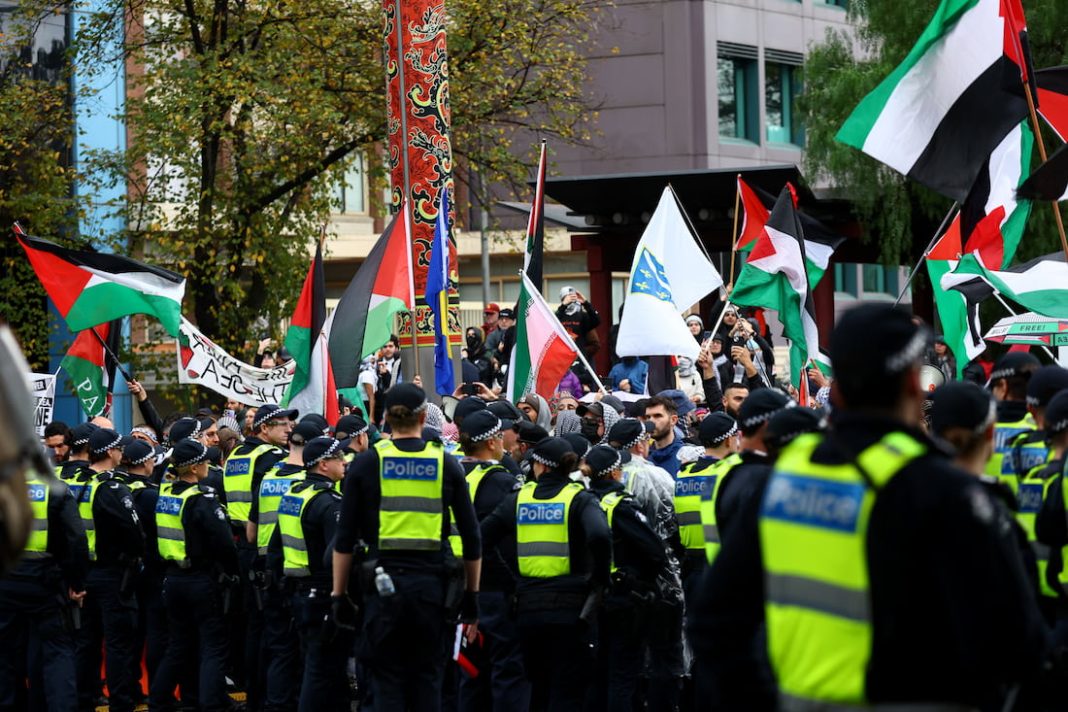A proposed crackdown on recurring protests has been blasted as undemocratic and dangerous, as one state premier suggests police time is better spent tackling serious crime.
A strong police presence accompanies weekly pro-Palestine rallies in multiple states, and NSW leader Chris Minns says that has become an unacceptable drain on resources.
Ordering a review into the handling of the marches, which have run through Sydney’s streets every Sunday for a year, the premier revealed NSW had spent at least $5 million on policing the protests in 2024 alone.
Police should be allowed to deny a request for a march due to stretched resources, he said.
The premier’s proposal was scary, NSW Council for Civil Liberties president Lydia Shelly said.
“The right to peaceful assembly and protest is the cornerstone of a democratic society, and any legislative changes that would effectively single out protest as a financial burden completely flies in the face of government obligations towards human rights,” she told AAP.
“Facilitating peaceful protests is just part and parcel of our democratic responsibility, so citing costs as a reason to curtail process protests, that’s a really, really dangerous precedent.”
There was a heavy police presence at Sunday’s protest when about 10,000 people congregated in Sydney’s Hyde Park after authorities ditched a court bid to shut the rally down.
An unauthorised demonstration also proceeded – a candlelit vigil on the one-year anniversary of the terrorist attack by Hamas on Israel that left about 1200 people dead and 250 more taken hostage – but no incidents have been reported.
Palestine Action Group Sydney organiser Josh Lees questioned why hordes of police were needed for a peaceful event.
“As we always said it would be, it was an entirely peaceful event, as all our protests for 52 weeks have been … Minns and all the others who participated in this campaign have egg on their faces and owe the Palestinian and Lebanese communities a big apology,” he said.
Organisers had argued October 7 marked the beginning of Israel’s counter-attack, which has killed more than 41,000 people in occupied Gaza, according to Palestinian officials.
Others suggested protesting on the anniversary of the Hamas attack was disrespectful.
NSW has a permit system that allows protest participants to disobey laws against blocking transport routes with police approval, although officials can go to court to deny permission.
A number of Australian states have clamped down on protesters and increased jail time and fines for disrupting roads, ports and other facilities.
Civil liberty bodies have labelled such laws a violation of the fundamental human right to protest.
The premier said the government and police would join forces for the review.
“We still have to have police to investigate serious crime in NSW, that’s proven to be incredibly difficult if our resources are tied up with marches and protests,” Mr Minns said.
“If an application is made every single weekend, week after week after week, draining police resources and time and taxpayer money, police and taxpayers in the state are entitled to say we’ve got other things taking place.”
The NSW opposition called for the premier to go further than the planned review and introduce a user-pays model for policing at repeat protests.
“Every dollar that’s spent on policing serial protests is a dollar that could be going towards improving the lives of NSW families,” Liberal leader Mark Speakman said.
Victoria Police said they were “pleased” with behaviour of those at a vigil in Melbourne on Monday evening and reported no incidents of note.
Despite the police praise, Premier Jacinta Allan said the vigil was not OK.
“(Monday’s) other event was … not an appropriate set of actions to take on a day that represented the single biggest loss of Jewish life since the Holocaust,” she said.



